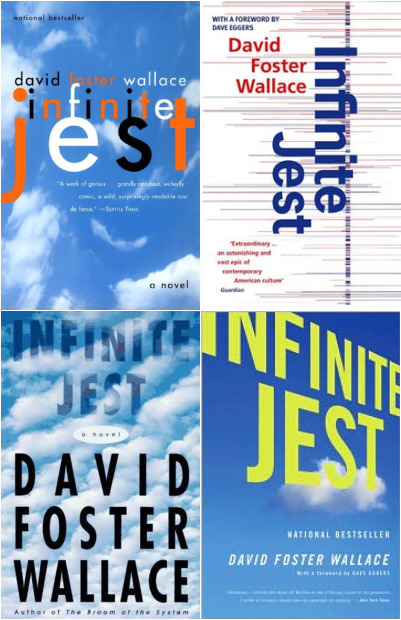 I have been reading Infinite Jest by David Foster Wallace for quite some time now. I have not talked or written about it much. Simply put, I have not really even known how to. Most of the time, while reading it at home, I just stop, look up at my wife, and say only with my facial expression "there's no way I can even talk to you about what I'm reading".
I have been reading Infinite Jest by David Foster Wallace for quite some time now. I have not talked or written about it much. Simply put, I have not really even known how to. Most of the time, while reading it at home, I just stop, look up at my wife, and say only with my facial expression "there's no way I can even talk to you about what I'm reading". In the purest sense I can think of, reading this novel has been a singular experience. Perhaps this is true of all literature; that reading is a solitary act consisting of not merely going over a story from point to point but of immersively enjoying the art of logically strung together words over the course of a narrative. But I have a feeling David Foster Wallace in his writing meant to give us a particular kind of "singular experience" that can only be experienced in the thing itself, making it imperative to read over every word; a kind of work that could be recounted in various anecdotes to someone who has read it as well ("Do you remember the part when Hal...") but as soon as one begins the description of any one scene they immediately begin to realize the inadequacy of their recounting and are then drawn to just go to the section itself and read it aloud. Meaning, Wallace wrote a novel that cannot simply be talked about (or for that matter made into movie or TV show), but has to be read.
 |
| If only we could have gotten inside DFW's head... |
And but so the reason I am writing this blog post is that in the current passage of Infinite Jest I am reading, something just happened to me as a reader that continues to happen again and again throughout the book: my reading of the text breaks down and I have to consult something outside the text in order to help me to comprehend the text. Now, all good literature should be challenging and have words that extend beyond any reader's current vocabulary; this is part of the joy of reading, this act of discovery. But I am beginning to think that Wallace actually intended for his readers to have this constant breaking down when engaging his text(s), because for me I could potentially have a "reading breakdown" every 2-4 pages. Let me explain.
Throughout the course of the book I have been in the habit of underlining (nearly) every word I do not understand the full meaning of, which after randomly opening the book just now I discovered four words underlined within a two page sample ("blepharoplasty", "mucronate", "nonprehensile", "Stanford-Binet-wise", from pgs. 314-315 of the Back Bay 10th anniversary edition). Not until the last couple of months have I actually started looking up these words, but when I do it causes me to stop, reach for my American Heritage Dictionary (in absence of an OED) and look the word up. If I allow it, I will do this quite often (2-8 times on average within a 2 page range), meaning my reading is constantly being interrupted. Then, if you throw in the endnotes that Wallace infamously included at the back of the novel (all 388 of them), the reading experience is interrupted even more. As I said above, these constant interruptions, these "breakdowns" in reading are apparently the author's intention, for as he said in an interview with Charlie Rose the endnotes "were used to disrupt the linearity of the narrative, to reflect his perception of reality without jumbling the entire structure." I am sure this sentiment could be extrapolated to his entire approach to writing.
What I am going to do here is offer a brief glimpse into what it is like to read a "typical" passage of IJ, a glimpse I now realize may not bring the novel any new readers. Well so be it. In his writing David Foster Wallace places his readers right into the middle of the vortex of language and history. Or perhaps it is an evershifting labyrinth of language and history, like Eco's library in The Name of the Rose. You are constantly finding yourself in strange rooms whose origins to and exits from are rather hazy. Either way, this is the type of literature I find exhilarating. It is at once both a lot of work and a pure joy to read. Reading it is a like walking or climbing up a mountain, an act which is a lot of work but still deeply satisfying, then only to be afforded the rush of skiing down that same mountain, where once you get to the bottom you are greeted by a chef cooking you a gourmet meal which you soon get to consume. That is, it is a lot of work to read but that work is always rewarded by various pleasures. It is a novel to be read by anyone who loves the beauty of words. It is the funniest and most thrilling novel I have ever read, although the book itself never stays in one place long enough to ever fit into those genres' boundaries. I guess I enjoy being messed with as a reader and I suppose this places me a little on the fringes. So be it. Still I think everyone could find much to enjoy in its pages.
+++ +++ +++
So here now is my attempt at telling the story of what it is like to read a "typical" passage from IJ. The "breakdowns" will be counted in parentheses:
The passage I am going to focus on comes from pages 692-693, a passage that essentially stops the narrative in order to give a description of the two main types of depression: the first being "anhedonia or simple melancholy" and the second "clinical depression" or "psychotic depression". These descriptions of depression mostly relate to the states of two characters, Hal Incandenza and Kate Gompert. So, (1) first note that here we have a break from the narrative in order to give a more clinical definition of the depressions which are plaguing some of the main characters in the book (one of the narrative's core themes), where the text reads more like an APA article but with the narrative still woven in to the text.
But let us back up a bit. (2) Just a page before this particular section on depression begins there was a section about a character named Poor Tony, a character who had not even been mentioned in the narrative for more than 200 pages (as far as I can remember). Then (3) the Poor Tony section was abruptly interrupted by a one paragraph section written from another character's perspective, Geoffrey Day, a character who is barely ever talked about at all and who in this section focuses his attention on another character (Randy Lenz) who had barely been mentioned in the past 80 pages. So then, getting back to the present, after the Geoffrey Day section follows the depression section. Quickly within entering this section there are several breakdowns. First (4) is the word "anhedonia" a word I do not know and a word to which endnote #280 is attached (please turn to page 1053 for the endnote), which contains the definition to anhedonia and (5) includes another word I have heard before but do not know the actual meaning of, namely "analgesia". I (6) go to my dictionary to look up both of these words but only find analgesia, trying to (7) make a mental note to look up anhedonia later. Then, within the next few sentences I encounter two more words I need to look up (8) "torpor" and (9) "gourmand". Finally the complete breakdown occurs on page 693 where (10) the text says, referring to people with anhedonia, "They have, as it were, denotation but not connotation." I realize here Wallace is trying to make an important point but that I have no idea what the difference is between these two words and therefore what that signifies for people dealing with this particular type of depression.
At which point in my own life's narrative my son breaks into our living room (in which I am seated) awaking from his nap, interrupting my reading and making me realize I am at the moment utterly confounded with the text and need to write a blog entry about it in order to attempt to explain this completely unique (to me) experience of reading a text. Then, as I am in the process of writing the blog I again become overwhelmed by all the knowledge there is to know, how little of it I actually possess, and how much more, comparatively speaking, David Foster Wallace possessed of it, thus causing me to think all my attempts at writing and all the ideas I have for writing actual books are a vain an vacuous exercise.
And remember, this is all an enjoyable experience for me. I really really like this book and what it does to me, this cyclically abusive literary relationship I am in.
_______________
Related Articles
Slowing Church Down in a McDonald's Culture?: a review of Slow Church
Why Study Literature?: A Concise Answer

No comments:
Post a Comment